Veteran students bring sense of community to Lipscomb
Lipscomb’s Veteran Services and the students it serves take servant leadership to a new level
Kalli Groce |
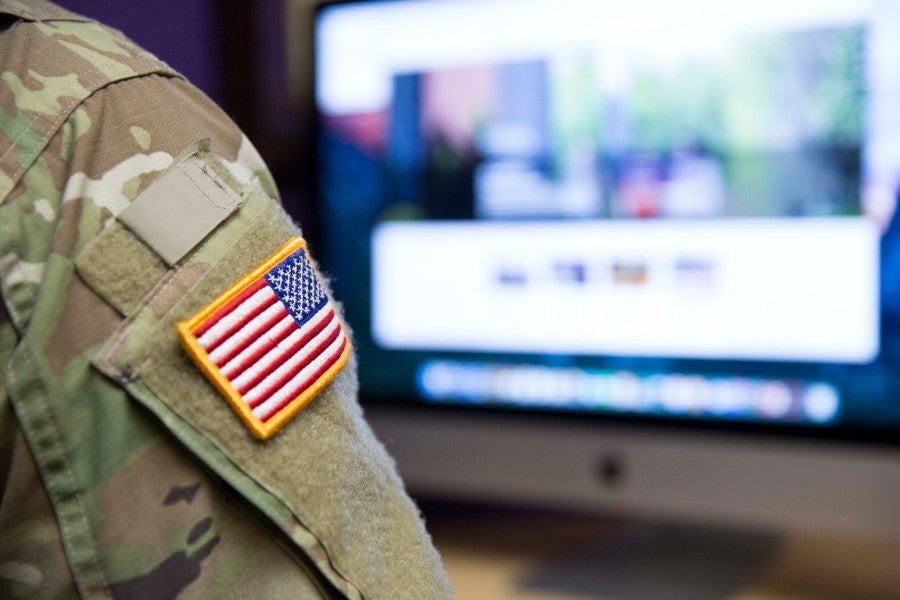
Lipscomb offers a tuition-free undergraduate degree through the Yellow Ribbon Enhancement Program and the Post-9/11 GI Bill.
“Community” is defined in the dictionary as “a unified body of individuals.” The United States military not only understands community, but it reinforces it in everything it does for those who serve. That’s why it feels so different for veterans when they leave the military and start to pursue a life outside of it.
For many, the place to start in their second chapter of life after their service is school, but they might be looking for more in a university than your typical high school grad would. That’s where Lipscomb’s Veteran Services comes in, reaching out to prospective students by offering what they will need most: both a high-quality educational experience and a new community that takes care of them like family.
Sam Lynn, the new director of Veteran Services at Lipscomb, spent 10 years in the United States Marine Corps before earning both his undergraduate and graduate degrees in business administration at Lipscomb.
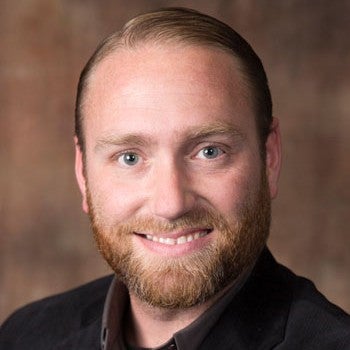
Sam Lynn
While he was working toward his MBA, Lynn was hired by Lipscomb under a Veteran Reconnect Grant from the Tennessee Higher Education Commission to make the process of awarding veterans transfer credits for their military education and experience more efficient and standardized, enabling them to make the most of their GI Bill benefits.
He understands the community well. “We provide opportunities,” he explains. “We give them direction, but they’re the ones who take the charge.”
According to Lynn, one of the pillars of what they do in their office is intentionality and purposeful relationship with the student veterans.
“When our students come by our office, it is because they want to be there,” he says. “That’s because we’ve built relationships with them through face-to-face interactions. We know most of them by name because we see them all the time. We walk them through the entire process of coming to school because it can be confusing and scary for those who haven’t navigated that in the past. So in the process of building relationships, we learn their stories. We know about all the struggles and difficulties they’ve overcome to be here.”
Jimmie Handley, coordinator of veteran programs, is also a graduate of the College of Business and is pursuing a master’s degree in divinity. He initially came onboard as program coordinator for Veteran Services, then changed to outreach coordinator. Three months later, when the director left, he stepped in as interim director of veteran services.
“We don’t just have veterans; we have dependents of veterans. We’re teaching collaboration and that this is a new chapter in your life that you get to write,” says Handley, who served in the United States Army for 20 years It’s not just collaboration with us, but it’s also with the student body here at Lipscomb.
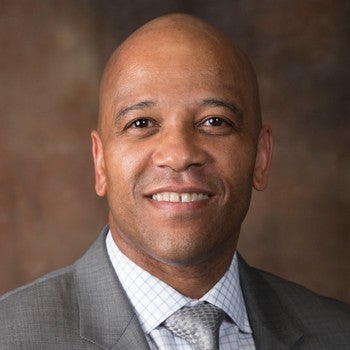
Jimmie Handley
Working Together to Serve and Lead
Lipscomb’s student veterans have an organization called the Campus Veterans Organization, and they are always looking for ways to continue serving beyond their military careers, says Handley.
“Servant leadership is a focus at Lipscomb, and our student veterans are taking the charge and the point on living that and not just teaching it but being the example,” notes Lynn. “Volunteer and service opportunities help them come together as a team.
“One of the things we often hear from incoming student veterans is about the loss of brotherhood and community, the esprit de corps that they miss from their time in the service. We continually try to provide opportunities to have brotherhood and relationship. It’s a family. It says that you are not alone, and there is somebody watching out for you,” he says.
Student veterans come to Lipscomb from a unique place. Many of them have spent years in the military, and they may have already established families to bring into the equation, which makes their needs different from those of many incoming freshmen. They also have a completely different perspective about going to college, as well as a different take on what that opportunity means to them and their future. Lipscomb not only provides them with opportunities to study, but it provides a place to receive guidance and mentorship as well.
Andrew Santander, a student veteran at Lipscomb and president of the Campus Veterans Organization, agrees. This 29-year-old has been married to his wife Arielle for eight years, and they have one daughter, Amelia, and another one, Adeline, on the way at the end of December. Santander served as an engineer in the Marine Corps for eight years before making the transition to be a college student. He aspires to go to dental school and to become an oral and maxillofacial surgeon in the Air Force.
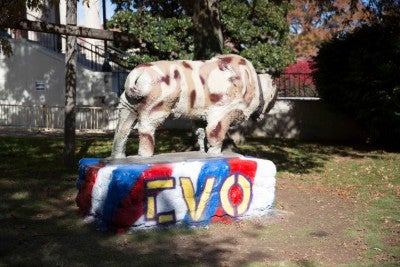
The Campus Veterans Organization is a student group for veterans.
He started applying to colleges while stationed in Okinawa, Japan, and notes that even the time zone differences, which are night and day, made communication a challenge. “My primary means of contact was via email, which sometimes took certain universities a few days to return,” he says. “Lipscomb was different, though.”
From the friendliness and availability of the professors to the friendships he has built with the veterans on campus and the students at Lipscomb who are genuinely happy to be at school and learning the skills needed to create a successful career in the fields of their choosing, Santander has been pleased with the community here.
“I mean absolutely everyone I have had contact with at Lipscomb has been kind and caring, whether it be the head of an individual department or the sweetest young lady that works the cash register for Chick-fil-A,” he says. “The sense of community Lipscomb embodies is definitely one attribute that sets it apart from other universities. The veteran’s office at Lipscomb is second to none. The men and women who work within the office will bend over backwards and do whatever you need them to do for you and your educational endeavors. Sam, Jimmie and Billie [Scroggins, the school’s veterans certifying official] look out for the welfare of all veterans who are at Lipscomb.”
Unique Challenges, Unique Goals
Handley meets veterans from all over, and they often tell him they are concerned about the impact their going to school will have on their families. “If the family is not happy, the veteran will not be happy and won’t be able to complete the mission that is at hand,” he notes.
In addition to providing support and encouragement through Veteran Services, Lipscomb offers a course specifically for vets called “God’s Word for Warriors,” which assists them with the transition from military to education. It addresses issues that are specific to veterans in a classroom setting with Tom Seals, chaplain and professor of Biblical practice.
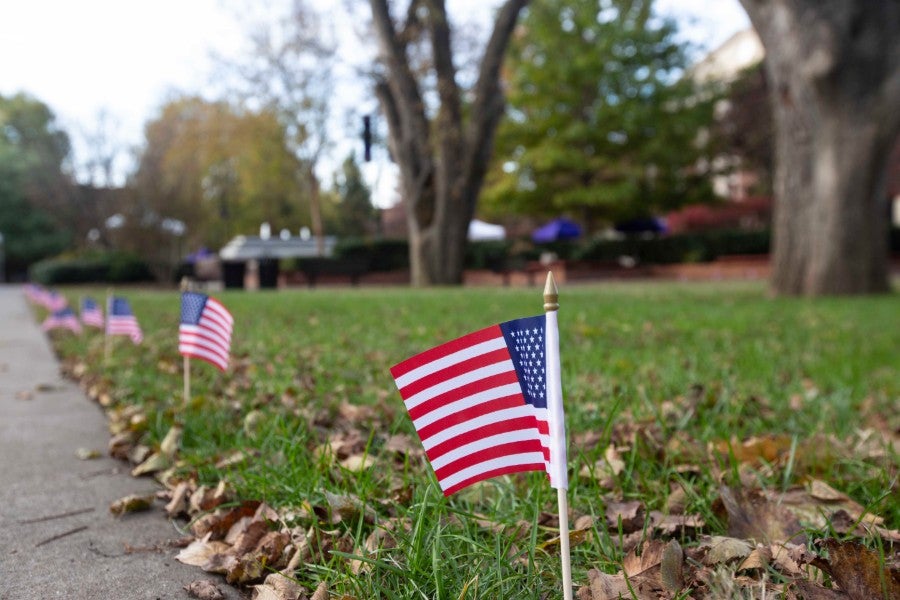
More than 400 flags were planted around campus on Veterans Day to recognize all of the veterans who have attended the university since 2001.
Some of the challenges student veterans face are the same one that any new student would face: coming to a new location where they’ve never been, navigating a new experience and making new friends. But for veterans, it can be more difficult.
“In the military, there are untold numbers of resources,” explains Lynn. “Everything you go through in the military, you are pretty much held by the hand and walked through. There is training upon training upon training. The military is the king of over preparedness when it comes to anything from combat to administrative to financial … any aspect of your service, you know you can always go to one of your sergeants or staff sergeants. If they don’t know the answer, they’ll find out who has the answer and they perform the same service we provide for our new students coming to school.”
For a new student veteran coming to school, they no longer have that help or they are not aware of it. “We try to provide as much information as possible right off the bat so they feel taken care of,” Lynn continues.
After all of that training, veterans are often surprised by how quickly the separation process from the military actually is. “When you get ready to leave the military, you get five days of preparation,” explains Lynn. “They’ll say, ‘This is a budget, these are your benefits, this is insurance. … They don’t care if you have a plan for where to go or if you are going to school. After that, they take your ID card, say thank you for your service and tell you to leave base.
“It is solely on the veteran to arrange where they’re going to go and what their plan is, to find housing, to decide if they’re going to school and to figure out which school,” he continues. “On top of that, many of them have families, so their entire family is affected by the decision they have to make. It’s a lot of stress. That’s why the family is such a big aspect of what we do. We encourage students to bring their families here as often as possible. Plus, many of these students work full time. They are juggling a ball of energy that has to be divided between family, work, school and sleep.”
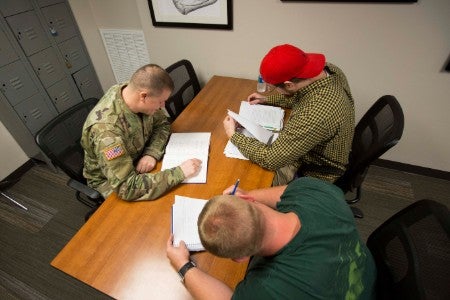
The Veterans Resource Center provides a place for students to study and find community.
“They also quickly go from being the expert to not being the expert,” Handley adds. “They are often called upon to take responsibilities in the military. It is difficult to understand typical college kids who are not as serious about things. And they often go from being in charge of 100 to 200 people and giving orders to taking orders, and it not being so easy. They go from getting an op order that they know how to quickly read, understand and execute to being given a syllabus that doesn’t make as much sense on first sight.”
Santander had the experience of coming into college at an older age than most traditional students and with an established life and family. Lipscomb has proven to be a great fit.
“I could count on Lipscomb, I felt safe with Lipscomb and, most importantly, I felt wanted at Lipscomb,” he explains. “This eased my mind of the negative thoughts and feelings I had heard from other veterans who had separated from the service. Some would say, ‘I feel like I have no purpose’ or ‘I miss the men and women I served with.’ Well, I have not one negative thought or feeling to express since being at Lipscomb. I feel I have a purpose here, and I definitely feel like the men and women veterans all have the same shared hardship I have had, generally speaking. This is what I was searching for in a college, not just another ‘we support our veterans’ type campus.”
For veterans who qualify for 100 percent of the Post-9/11 GI Bill benefits, Lipscomb University has committed to allocate the necessary funds to allow them to earn a tuition-free undergraduate degree through the Yellow Ribbon Enhancement Program. The university also offers qualifying student veterans a variety of graduate degrees tuition-free or at a greatly reduced tuition rate.
Learn more about Lipscomb University's programs for military and veterans.